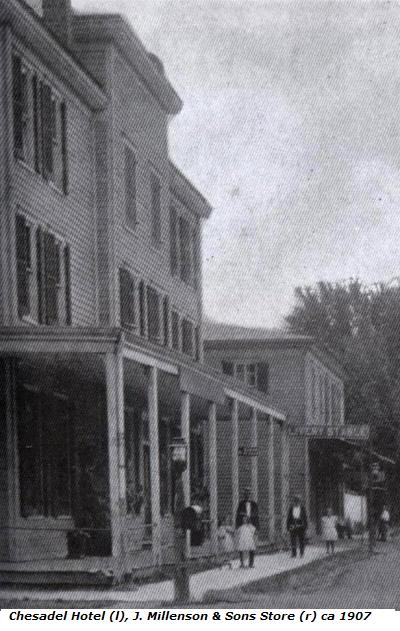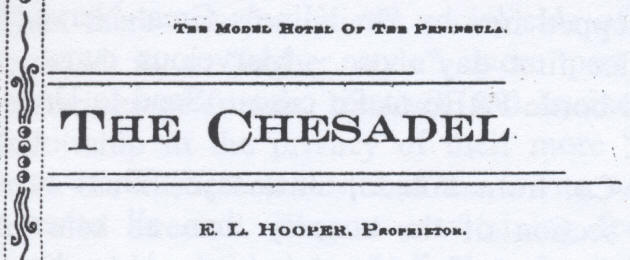East New Market
Property Reports
43 Main Street
The Hotel Chesadel
 In
1889, the Bramble House was moved to its current site at 107 Main Street to
clear the land for the building of The Chesadel.
In
1889, the Bramble House was moved to its current site at 107 Main Street to
clear the land for the building of The Chesadel.
Edward L. Hooper and his mother-in-law Susan Wales had the 3-story Chesadel Hotel built in 1889. In 1914, the well known hotel was destroyed in a devastating fire. In 1915, the Realty Building was built on the land formerly occupied by the Hotel Chesadel and the Old Dorset Pharmacy.
The Democrat & News - February 1889 -
The New Market people are claiming that Hooper's new hotel in that town surpasses any of our Cambridge houses. It will have twenty-four rooms, is three stories high, has electric bells, bath rooms, and all modern appliances. A large and fine livery will be attached, and the people will exert themselves to boom their growing town to its full merits. Some even go so far as to say that soon Secretary and East New Market will be one and will be known by the appropriate name of East and West New Market. Wait till the Chesapeake and Delaware Canal joins the Choptank to Delaware Bay and still greater wonders will arise along the banks of the upper Choptank.

Cambridge Chronicle - 6 December 1914 - Big Conflagration at East New Market
Loss estimated at about $35,000, With But Little Insurance - Hotel Chesadel, Millenson's Store, Post-Office, Jefferson's Drug Store, Pegelow's Shoe Store, And Morgan's Barber Shop And Home Destroyed -
As a result of the worst conflagration ever known in the history of the town, much of the business section of East New Market is today burned to the ground, and all that remains of its well-known hotel and its largest store, as well as several other buildings, including the drug store, a shoe store, the post office, and a barber shop, are piles of ashes and pieces of twisted iron, with here and there some other water soaked matter that was not quite reduced to ashes. And had it not been for the heroic work done by a number of the citizens of the place, assisted by others who happened to be present, probably a number of dwellings and other stores would have been added to the loss.
The fire seems to have broken out shortly before seven o'clock, in the large store of J. Millenson & Son, which is located on Main Street near the corner, being separated from the Hotel Chesadel by an alley. From the store, the fire swept across the alley to the Chesadel Hotel, and also across Main Street, to the building occupied by Mr. Charles Morgan, as a residence and a barber shop. After getting a foothold in the Hotel Chesadel, the fire swept the huge frame structure, burning it from top to bottom, and destroying the portion of the building occupied as the post-office; also, at the same time, it seemed, the drug store owned by Mr. Thos. O. Jefferson, and managed for him by L.R. Dukes, caught fire, and was completely wiped out, and from the drug store, the building owned by Mr. William F. Drain, of Cambridge, one portion of which was occupied by Mr. F. Pegelow, as a shoe store and repair place, and the other by Mr. Harry Howard, as a grocery store, caught, and the stock of goods of Mr. Pegelow was practically completely destroyed, but that of Mr. Howard was but little damaged.
The loss by the fire is estimated to be between $35,000 and $40,000, and, unfortunately, there seems to be but little insurance, this condition being due to the high cost of insurance in East New Market, which has ranged from three and one-half to four percent. The losses and insurance are about as follows:
Hotel Chesadel, built about twenty-five years ago, at a cost of $10,000, in good condition, and could not be replaced under present conditions at anything like that amount, no insurance. Furniture and other equipment in the hotel, including practically all of the personal effects of Mr. & Mrs. E.L. Hooper and Mrs. Wales, loss of about $5,000, no insurance. Store building occupied by J. Millenson & Son, valued at about $3000, insurance of $1000. All of the above property was owned by Mrs. S.J. Wales, mother of E.L. Hooper.
J. Millenson & Son carried a stock of dry goods, clothing, dresses, suits, coats, boots, and shoes, and a large general line. Their stock is estimated to have amounted to between $9,000 and $10,000, with insurance of between $6,500 and $7,500. They had during the past week received goods amounting to about $2,000.
Only the most heroic efforts by the citizens prevented the store of E. Holland & Co. from being destroyed, as the front of the building, which is directly across the street from the Hotel Chesadel, was on fire several times, and is quite badly charred. Had it not been for Mr. L. Cad Howard, who stood upon the porch and kept a small stream of water from a force pump going on it, the store would have undoubtedly have been burned, and in doing so, Mr. Howard had the whole of one side of his face badly burned. The old Fletcher property, which sits back in the yard just across the street from the Hotel, and which is owned by Mr. Thomas S. Collins, but which is occupied by Mr. Edward L. Jones, and Mr. Oliver W. Hubbard, was in danger all the time, but was saved without loss. Likewise the home of Mr. Wm J. Payne, which was on fire several times, was saved by Mr. Wm Murphy, assisted by others. Mr. Murphy seemed to be able to withstand the heat better than the others, and for this reason was able to keep water on the building at the place where it caught.
The building occupied by Mr. Charles Morgan was said to have been worth about $1,000, and was owned by Mr. W.J. Payne, who had not insurance upon it. The building was familiarly known to the residents of that section as the "Red, White, and Blue" house, and was moved to East New Market from the Sherman property. Mr. Morgan estimated the loss, including between $80 and $100 in cash which was burned, at about $500, with insurance of $300.
The drug store property and stock of goods were owned by Mr. T.O. Jefferson, and were said to have been valued at about $4,000, although he had been asking $4500 from them. Mr. Jefferson carried insurance amounting to $2500.
The Drain building is estimated to be worth about $500, and is only partially damaged. There is no insurance upon it. The stock of goods of Mr. F. Pegelow was supposed to be worth about $1200, and had $1000 insurance, so that his loss is practically covered. In the post-office nearly all of the effects were removed, so that there is no loss of any amount.
The Masonic Temple was on the second floor of the Drug Store Building, but nearly all of the regalia, etc., were saved, so that there is little, if any, loss to them; likewise with the Grangers, who also used the same building.
The people of East New Market generally expressed themselves as appreciating very deeply the assistance rendered by the citizens of the surrounding towns, people having come from Secretary, Choptank, Preston, Federalsburg, Hurlock, Cambridge and other places to give assistance. But for the fact of the rainy weather of the past two days, it is likely the loss would have been much heavier, and nearly all of that portion of the town on Main Street would have been destroyed.
Denton Journal - December 12, 1914 -
In a fire which destroyed $30,000 worth of property at East New Market Sunday night, the drug store and stock of goods belonging to Mr. T.O. Jefferson, of Federalsburg, and in charge of Mr. Louis R. Dukes, formerly of Denton, was consumed, together with the stores of J. H. Mullinson and F. Geznow, the residence of Charles Morgan, and the Hotel Chesadel. The fire started in the Mullinson store, and its origin is a mystery. The local fire company was assisted by Cambridge firemen, but, because of poor water supply, the work of the fire-fighters was not very effective. The large blaze from the fire at East New Market on Sunday evening was observed by a number of people here. Messrs. James, Orland, Edwin, Phil, and Ralph Wright went from here in a machine, and were among those who helped fight the fire, which at the time threatened to wipe out the entire town.
Address Given At Cambridge Rotary Club by Clarence L. Saxton - 1928 -
On December 6, 1914, a $50,000 fire swept the business section of this town. The hotel, three stores, one barber shop, on drug store, and the post office were destroyed. Five other buildings were damaged. The hotel was a three story structure of forty rooms. A community building which is a credit to the town, replaced the hotel building. This however, did not make up for the loss of the hotel. The hotel was well known and patronized by the general public and was considered the equal of any on the shore. With the going of the hotel came the loss of business of the traveling public.